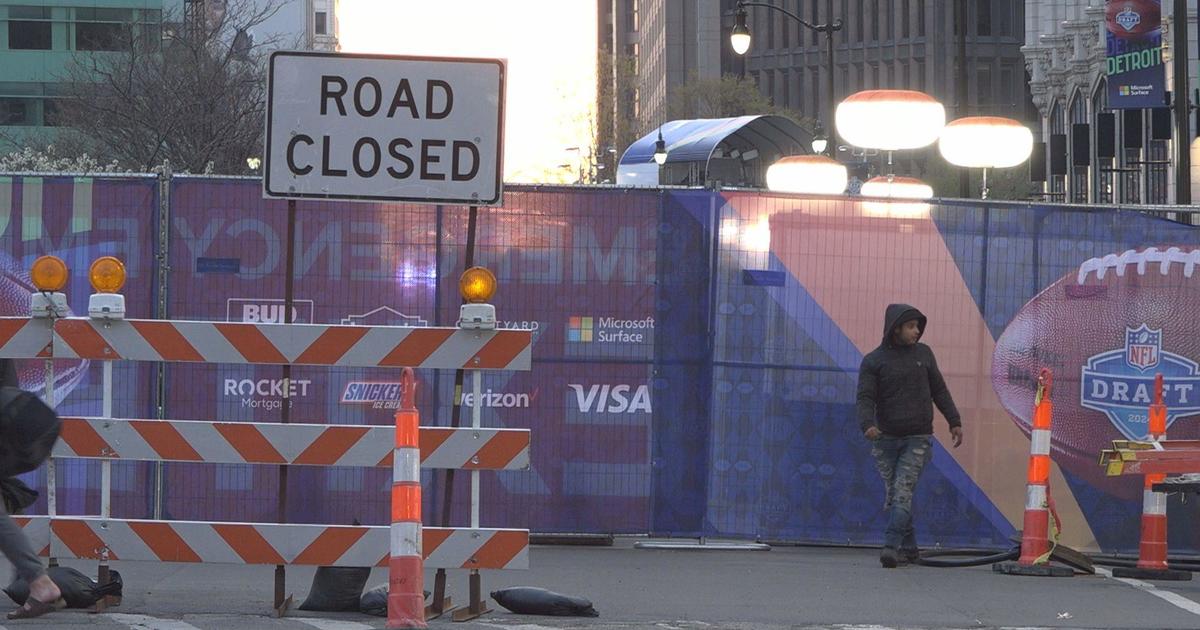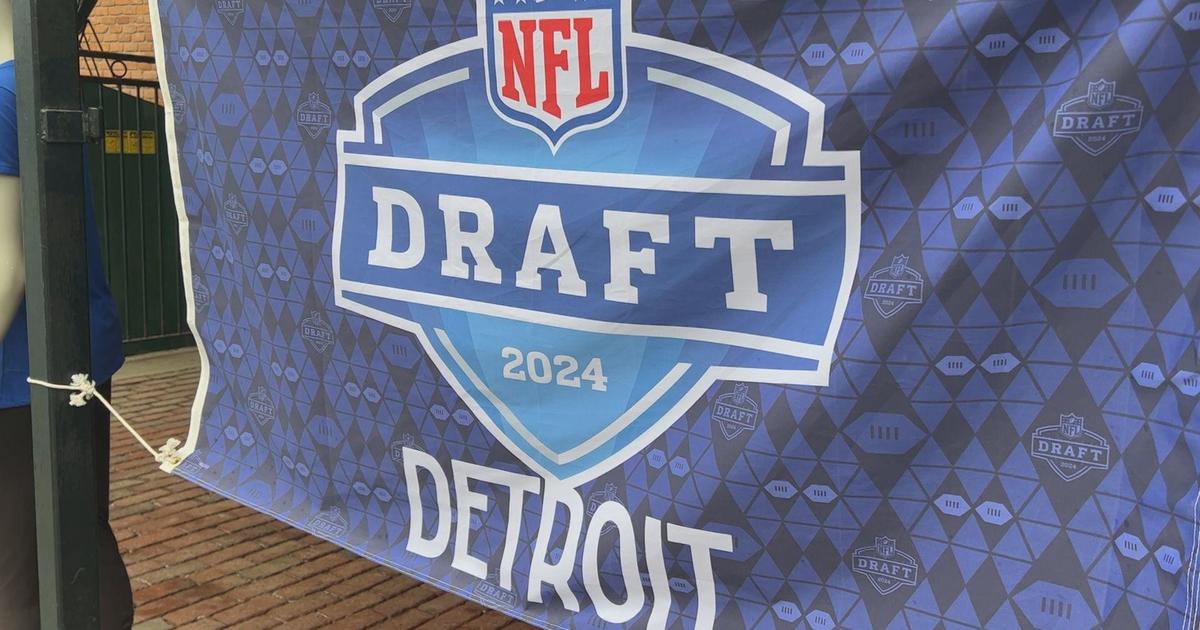What It Takes To Call Detroit Home For Natives And Newcomers
DETROIT (AP) - In 1950, Detroit had a population of 1.85 million. Today, 690,000 remain -- a mere third of those who lived here when this was the fifth-largest city in America. The city's downturn includes decades of white flight, the auto industry's decline and a financial crisis that ended in bankruptcy.
Detroit adopted this motto after it was nearly destroyed by fire in 1805: "It will arise from the ashes."
Those who choose to live here now still believe that, whether they're natives or newcomers.
Here are some of their stories, with a focus on housing, from a $500 abandoned building to the city's most expensive apartment.
GROWING UP HERE AND STAYING
Mike Evans, 28, a Detroit native, is a senior tech developer for Loveland Technologies, a company that's mapped every property in Detroit in an effort to help rebuild communities.
Evans was raised in a historic neighborhood called Boston-Edison, which had an aging population and few kids for him to play with. But he had a computer - which led to his tech skills and passion for coding. He traveled to school elsewhere in the city, and describes parts of Detroit in the 1990s as "terrifying."
He's now restoring the house where he grew up. It dates to 1895, and has details worth preserving, like enamel bathtubs and original oak floors. "I've got no kitchen for the next year," he says, describing his renovation plans. "If you're thinking about moving here, your start-up costs might be cheap. But a lot of these houses require a lot of work or a lot of money."
A colleague, Lauren Hood, 43, a community organizer for Loveland, was also born and raised in Detroit. Like 83 percent of Detroiters, Hood and Evans are African-American.
Hood's parents sent her to suburban schools and later moved to the suburbs after a break-in, but Hood stayed in Detroit. She now lives in a loft in the historic Brush Park neighborhood.
She thinks those tempted by the $500 houses for which Detroit has become famous may be "unrealistic" about what it takes to make them livable. "You better bring 10 people with you," she said.
Drew Philp bought one of those decrepit $500 houses. A story he wrote about it for BuzzFeed got 1.6 million views and led to a book contract from Scribner.
Philp, 28, said in an interview that the book will include Detroit history as well as his experiences building "everything but the frame" of the house, from the foundation to the roof.
Philp comes from a "family of builders," in the tiny town of Adrian, Michigan. What he didn't know about construction he learned in the library. Along the way, he slept on his workbench, lived without lights and kept warm with a woodstove. One memorable night, he stood with a shotgun at the top of the stairs as someone tried kicking the door down. His dog went crazy. The intruder left.
The book will also address "the struggle for African-American self-sufficiency in Detroit," says Philp, who is white but notes that most homes auctioned for back taxes were once owned by blacks. Philp bought a house that hadn't been lived in for 10 years to show "how to do this respectfully" without pushing people out.
"DO YOU HAVE A GUN?"
Kendra Hakola, 29, got her teaching degree "so I could teach in Detroit." She lives in a $600-a-month, one-bedroom apartment in Midtown, an emerging hipster neighborhood near Wayne State College. Her apartment's nothing fancy, but it's safe, nice and affordable on a teacher's salary.
At first, Hakola recalled, acquaintances in her hometown of Marquette, in Michigan's Upper Peninsula, asked her things like, "You're living in Detroit? Do you have a gun?"
"People thought I was crazy," she said. "But I don't just feel safe in Detroit. I feel welcomed. I feel appreciated."
FROM HOMELESS TO A HOME
Native Detroiter Sylvia Hubbard and her three kids lost their home in an electrical fire in 2013. "It happened so quick," she recalled. "We got everybody out but we lost everything."
They ended up staying in houses so dilapidated, squirrels lived inside. Her daughter made a bed from milk cartons and a door; they had no electricity; they were robbed five times. "I said, `This is going to get better,' but at the time, all hope was lost," Hubbard, 42, said.
She applied for a home through Habitat for Humanity Detroit. Many applicants for Habitat housing are turned down because they lack jobs, which they need to pay mortgages, taxes and upkeep. But Hubbard qualified: She works as a 911 operator - and writes romance novels on the side.
Still, she wasn't just handed a key. Like all Habitat families, Hubbard and her kids put in 350 hours of sweat equity helping build other homes. She'd never held a saw or nail gun before, and her kids learned construction skills too.
In 2014, they moved into a home newly built on a vacant lot in the Morningside Commons neighborhood, on a street Habitat is trying to stabilize by bringing families in.
"This is Detroit?" her daughter asked when told it was safe to go in the backyard. Her son no longer has asthma attacks.
Habitat has raised $9 million in a $25 million campaign to build homes for 500 families in Detroit. But it's a drop in the bucket: Detroit has 14,000 homeless families.
DETROIT'S MOST EXPENSIVE APARTMENT
Jerome Huez is president of The Loft Warehouse, a real estate brokerage firm. His listings include loft condos in a renovated piano factory that go for $220,000-$475,000. He also sells residences in the Westin Book Cadillac, Detroit's fanciest hotel.
Cadillac condos include the city's most expensive apartment - a 4,470-square-foot penthouse suite on the 29th floor that will be priced close to $2 million.
"I come from France," Huez said. "I wouldn't be able to do anything like this in Paris. Everyone who is here has chosen to come or to stay. If they don't like Detroit, they leave."
© Copyright 2015 The Associated Press. All Rights Reserved. This material may not be published, broadcast, rewritten or redistributed.



